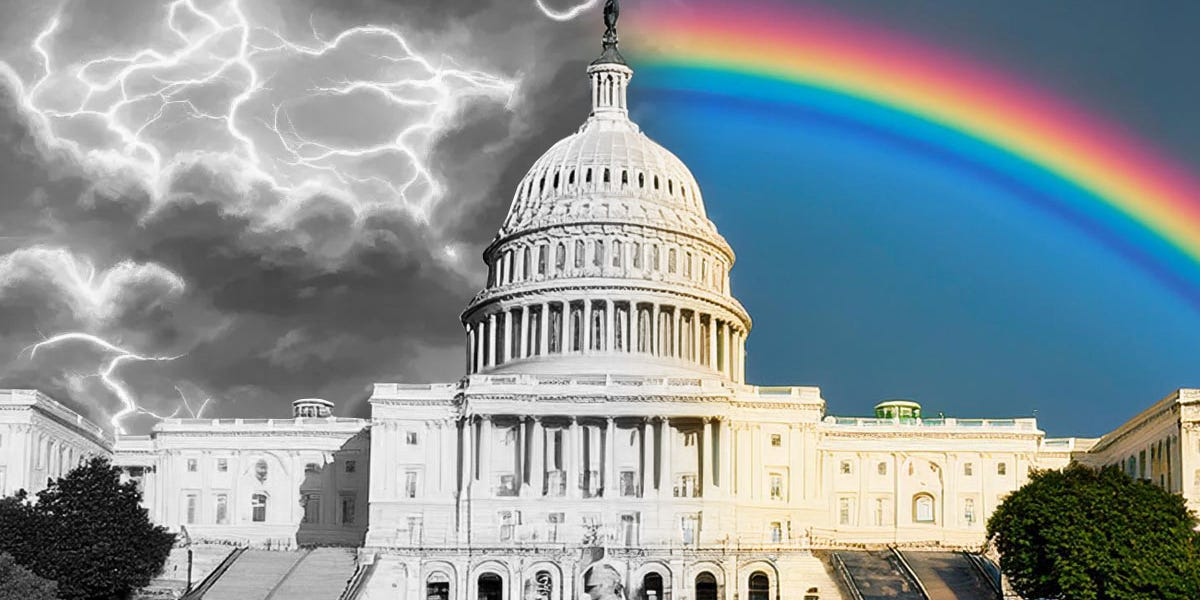Audio playback is not supported on your browser. Please upgrade.
As we stand on the precipice of Donald Trump’s return to the White House, the state of American democracy hangs in the balance.
The past few years have seen a troubling erosion of democratic norms and institutions, leaving many to wonder: Can our system withstand another Trump presidency without significant reforms?
This question is not just rhetorical—it’s existential.
Recent data paints a sobering picture of American democracy. As of December 2023, a mere 28% of U.S. adults expressed satisfaction with the way democracy is working in the country—a record low.
This dissatisfaction cuts across party lines, though it’s more pronounced among Republicans (17%) than Democrats (38%).
Trust in government institutions is at an all-time low. The three branches of the U.S. government face historically low levels of public confidence, with a majority of Americans believing the federal government is ineffective in positively impacting their lives.
This sentiment is exacerbated by the perception that the government primarily serves political elites rather than the general public.
The threats to American democracy are multifaceted and deeply concerning:
- Political Polarization and Misinformation: The increasing political divide, fueled by misinformation and false narratives, is undermining trust in democratic processes and institutions.
- Erosion of Democratic Norms: The rejection of election results by significant political figures and the normalization of political violence, as evidenced by the January 6, 2021, Capitol riot, represent a dangerous trend.
- Voter Suppression: Measures such as strict voter ID laws and reduced voting times are seen as attempts to disenfranchise significant portions of the electorate.
- Technological Influence: The concentration of power in the hands of tech giants and the use of technology for surveillance threaten democratic freedoms and privacy.
- Rise of Populism: Populist movements that challenge democratic norms and institutions are exploiting economic and cultural grievances, driving wedges between different societal groups.
In the face of these challenges, liberal think tanks, scholars, and activists are proposing a range of reforms to strengthen and protect our democratic institutions:
- Voting Rights Expansion: The John R. Lewis Voting Rights Advancement Act aims to restore and strengthen protections against racial discrimination in voting.
- Additionally, the Freedom to Vote Act proposes modernizing elections with provisions for early voting, same-day registration, and online registration.
- Electoral System Changes: There’s growing support for shifting from first-past-the-post systems to proportional representation, which could better reflect the diversity of voter preferences and reduce political instability.
- Institutional Safeguards: Measures like the Peace Act aim to protect voters and election officials from intimidation and violence.
- Automatic voter registration is another reform promoted to simplify the registration process and ensure more inclusive electoral participation.
- Combating Misinformation: Increased media literacy programs and coordinated efforts to debunk election myths are crucial in the fight against misinformation.
- Technological and Civic Innovations: Civic technologies, designed with transparency and accountability, could empower citizens and improve democratic participation.
As we confront these challenges, it’s crucial to remember that the United States has faced democratic crises before. The Jim Crow era, for instance, saw severe erosion of rights for Black Americans.
However, through sustained activism, legal challenges, and public advocacy, the Civil Rights Movement was able to dismantle many of these discriminatory laws and restore voting rights.
This historical resilience, coupled with the decentralized nature of U.S. elections, provides a framework for addressing current challenges.
The focus on voting rights, combating misinformation, and strengthening institutional safeguards offers pathways to reinforce our democratic foundations.
As we brace for Trump’s return to the presidency, the state of American democracy hangs in the balance. The threats are real and pressing, but so too are the opportunities for reform and renewal.
It’s up to each of us—citizens, activists, and leaders alike—to engage in the hard work of strengthening our democratic institutions.
The road ahead is challenging, but history shows us that democracy can be resilient when its citizens are engaged and vigilant.
As we face this critical juncture, let us commit to being active participants in the democratic process, advocating for reforms, combating misinformation, and holding our leaders accountable.
The future of American democracy is in our hands. What role will you play in shaping it?
Enjoying this article?
Support independent writing and receive free eBooks and well-researched articles.
Paid subscribers receive special, in-depth downloads and more.





